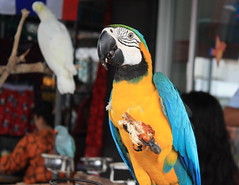 經由國際刑警組織(Inrpol)的協助,泰國警方掃蕩亞洲野生動物犯罪網絡。在12月份前兩周,警方指揮掃蕩行動、調查和對此區進行逮補任務。
經由國際刑警組織(Inrpol)的協助,泰國警方掃蕩亞洲野生動物犯罪網絡。在12月份前兩周,警方指揮掃蕩行動、調查和對此區進行逮補任務。
由Operation Stocktake稽查行動小組、國際刑警組織的環境犯罪打擊計畫(Environmental Crime Programme)、和來自印度、印尼、馬來西亞和泰國的執行機構突檢各市場、餐廳和商店,調查是否有保育動物參雜在合法商品中進行非法販賣交易。而且他們也留意是否有人出售野生動物肉或叢林野生動物肉品供消費者食用。(譯註:bushmeat是指大猩猩、黑猩猩、森林羚羊、鱷魚以及非洲灌叢野豬的肉,為住在森林的非洲人主食,以及數以千計人口的收入來源。)
近期查獲行動如下:
- 印度野生動物犯罪防治專局突擊檢查37家商店逮捕10名嫌犯,將因交易象牙和豹爪等物品被起訴。
- 在非法交易的證據中,除了有海參、貝類等海洋生物外,也發現一些瀕危鳥類。
- 印尼的安加里曼丹警察局逮捕4名殺害紅毛猩猩的嫌犯。警方還發現槍砲蹤跡和猩猩的骨骸。
- 馬來西亞野生動物和國家公園局官員突擊檢查21家店和餐廳。結果發現有4名將面臨私藏保育動物的指控。一家餐廳被查出販售豪豬、麝貓和野豬肉。
- 泰國警察自然資源和環境犯罪組致力於掃蕩泰國最大的市集──曼谷的札都甲市集(Chatuchak Market),據信此處為非法野生動物交易大本營。
調查單位正在調查研究從突檢行動中蒐集來的情報資料,並持續調查中。
國際刑警組織的警察服務執行主任Bernd Rossbach談到:「這項行動展現出國際刑警組織對抗跨國犯罪--像是非法交易野生動物上的全球網絡合作行動實力。Interpol與190個成員國的合作,協力打擊對全球環境安全和人類健康造成威脅的犯罪行為。」
在曼谷的國際刑警組織官員Justin Gosling說,「名為Stocktake的行動是往後一連串針對掃蕩區域野生動物犯罪市場強而有力的開始。這野生動物犯罪市場不僅對野生物種和其居住環境形成威脅,也意味著可藉由動物傳染給人的人畜共患病,將對大眾健康造成危機」
其他Interpol的活動中,非洲和亞洲18個國家包括海關、警察、檢察機關和專業機構派出的代表參加第一個國際工作站,此工作站建構一「控制下交付」(controlled deliveries)的打擊網絡,嚴格取締森林資材和野生動物違法貿易者。
「控制下交付」方式已用在毒品調查和菸草走私,但用於野生動物走私方面卻是頭一遭。(編註:是指在司法機關的監控下,違禁品、贓物或毒品,可以繼續交到貨主手中,藉以追查幕後藏鏡人、其他共犯或上下游的集團。)
因為在通常的情況下,攔截違禁物品只能抓到攜帶者(行話為騾子,mule),不容易擒獲主導走私的首腦。藉由「控制下交付」的偵查方法,當局能在運輸鍊的各站點蒐集證據,最後予以確認、逮捕並起訴走私首腦。
目前,這項合作取締行動的參與者,對於「控制下交付」的立法、執行能力及運作方法上已達成共識。
Wildlife crime networks in Asia have been hit by a police operation against the illegal trade in endangered species coordinated by Interpol. During the first two weeks of December, police conducted raids and investigations and made arrests across the region.
Supported by Operation Stocktake, Interpol's Environmental Crime Programme, enforcement agencies from India, Indonesia, Malaysia and Thailand inspected markets, restaurants and shops to identify those selling and trading endangered wildlife alongside legal products. They also were on the lookout for the sale of wildlife meat, or bushmeat, for human consumption.
India's Wildlife Crime Control Bureau carried out searches in 37 shops and arrested 10 suspects, who now face criminal proceedings for trading items such as ivory and leopard claws.
A number of birds were recovered as evidence along with marine animals such as sea cucumbers and shells.
East Kalimantan Regional Police arrested four suspects believed to be responsible for the killing of orangutans. They recovered firearms and what are believed to be orangutan bones.
In Malaysia, officers from the Department of Wildlife and National Parks inspected 21 shops and restaurants. As a result, four persons are facing charges for possession of protected species. One restaurant was caught selling porcupine, civet and wild boar meat.
Officers from the Thailand Police Natural Resources and Environmental Crime Division focused their efforts on Bangkok's Chatuchak Market, the largest market in Thailand and a known hub for illegal wildlife trafficking.
Investigators are developing and studying intelligence gathered during the operation and investigations continue.
Interpol's Acting Executive Director for Police Services Bernd Rossbach said, "This operation demonstrates the strength of the Interpol global network in coordinating operations against transnational crimes such as wildlife trafficking. Working with its 190 member countries, Interpol helps combat crimes which are a threat to global environmental security and human health."
Justin Gosling, Interpol's Officer in Bangkok, said that Operation Stocktake was a strong beginning to a series of actions targeting regional wildlife markets which are not only a threat to wild species and their welfare, but also represent a danger to public health through the potential spread of zoonoses, diseases that spread from animals to humans.
In other Interpol activity, 50 representatives from customs, police, prosecution and specialized agencies from 18 countries across Africa and Asia attended the first international workshop to establish a network of controlled delivery units for forest and wildlife law enforcement.
Controlled deliveries have been a tool for investigating drug and tobacco smuggling, but their use in wildlife smuggling is more recent.
But interception often leads only to the arrest of "mules" or couriers and seldom to the arrest and conviction of the criminals who direct and organize the smuggling.
By allowing the contraband to be delivered in a "controlled" manner, authorities can gather evidence at each point in the chain and, eventually, identify, arrest, and prosecute the ringleaders.
Workshop participants agreed on ways to address the legislative, capacity and operational aspects of controlled deliveries.





